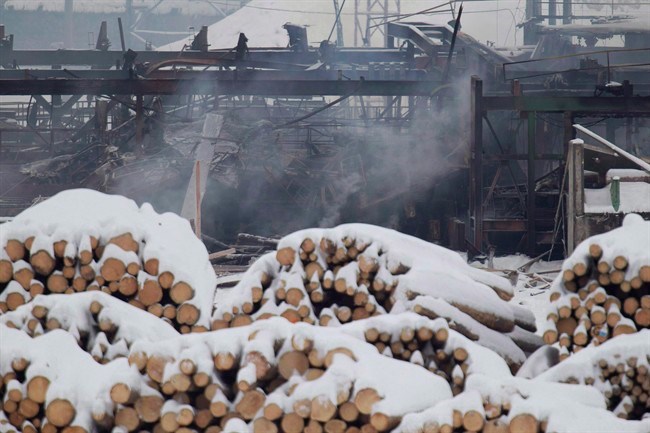 For all the faith chief coroner Lisa Lapointe has in her authority to get to the bottom of the Burns Lake mill tragedy, Opposition New Democrats insist an inquest just isn’t going to cut it.
For all the faith chief coroner Lisa Lapointe has in her authority to get to the bottom of the Burns Lake mill tragedy, Opposition New Democrats insist an inquest just isn’t going to cut it.
��
They’re joined by victims’ families and others in the community in demanding a much more far-reaching investigation into the fireball explosion that ripped through the Babine Forest Products mill two years ago.
Opposition Leader Adrian Dix filled in some of the details Monday on the forum he wants to see used to explore the deaths. That is a public inquiry, with full powers to plumb “the actions taken by all levels of government, government agencies and delegates, employers and workers leading up to and following the Babine explosion.”
It’s the “following” part that delineates the difference between government and the Opposition. Because what happened after the explosion was a jurisdictional and bureaucratic mess.
WorkSafe B.C. launched one of the biggest investigations in its history, only to be disparaged and belittled by the Criminal Justice Branch after the agency handed over all the evidence. The lawyers said the agency didn’t collect evidence in a way that would allow it to be used in a prosecution, and didn’t handle the case properly.
As it stands, the most the mill owners might expect is an administrative penalty of some sort.
The unsatisfactory outcome prompted Premier Christy Clark to have her deputy minister look into the situation. John Dyble produced a report in February that outlined the investigative shortcomings and recommended a number of improvements. But it also ruled out a public inquiry, citing a legal view that Crown counsel’s decision not to lay charges shouldn’t be subject to an inquiry.
The B.C. Liberal government has been holding to that line ever since.
The NDP produced a counter-argument Monday, saying a public inquiry is perfectly legitimate in the circumstances.
The view that an inquiry couldn’t revive the chances of charges being laid doesn’t rule out the possibility of an inquiry to fix and revive the workplace protection system in B.C., said Dix.
Lapointe publicly reassured people three weeks ago that the inquest, which she will conduct, will address concerns.
“I know they [the questions] will be answered, and I wanted to provide reassurance that most definitely there will be a thorough public review of all the circumstances.”
She said normal rules of evidence don’t apply to testimony, so there will be very broad questioning, and participants’ answers can’t be held against them, which leads to more openness.
She also touched on one of the underlying issues, people’s need to see penalties in cases of perceived negligence.
“For some reason, there is the notion that accountability must include punishment,” she said. “We do not find fault, but there is definitely public accountability .... The jury can certainly point out where there are deficiencies.”
There’s no doubt the punishment angle is high in the Opposition’s minds. Dix and others cite the fact that in more than 1,300 B.C. workplace fatalities in 10 years since federal laws were toughened up following the Westray mine disaster, there hasn’t been a single prosecution.
The public inquiry he has in mind would presumably hammer the government over the mishandled investigation. It could also make findings of misconduct against individuals. But it’s doubtful whether it would produce charges, or any kind of prosecution. That book seems to be closed.
The lawyer advising the Opposition said a coroner’s inquest is limited to determining facts related to deaths. It is circumscribed narrowly by law. The jury can recommend, but it’s only expected to certify how, when, where and by what means the deceased died.
Also in play is the Criminal Justice Branch’s view that the company can cite due diligence in defending itself.
The lawyers said it could rely on WorkSafe’s own testing of dust levels, which found them below the danger limits just weeks before the explosion.
They said: “Babine would likely be able to establish, on a balance of probabilities, that it did not know, and could not reasonably have foreseen, that sawdust could cause a catastrophic fire and explosion of the nature that occurred.”



